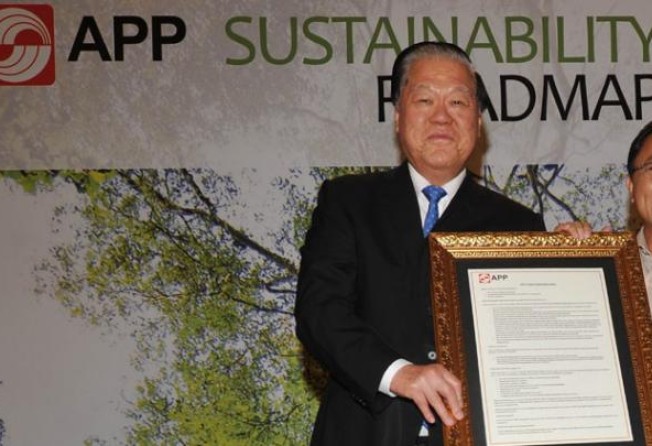APP's pledge on Indonesia's forests brings hope
Bustar Maitar welcomes paper company's new conservation policy

Last week, one of the biggest paper companies in the world announced a new forest conservation policy that, if implemented, will end the company's long and controversial history of deforestation. Asia Pulp & Paper has pulp and paper mills both in Indonesia and in China, and is one of several companies that together dominate the China and Hong Kong paper market.
Sometimes, it has felt as if stopping the destruction of Indonesia's rainforests is all but impossible. The easy availability of vast areas of forestland in Indonesia, coupled with the ineffective enforcement of its laws, has made the country economically attractive to international corporations. They profit as the rainforests and peatlands - home to thousands of communities and countless endangered plants and animals - give way to inefficient wood pulp and oil palm plantations.
Many of China's paper mills are supplied with pulp that comes from felled Indonesian rainforests.
But today, the prospects for what remains of these precious rainforests look brighter. Asia Pulp & Paper has committed itself not to establish further plantations or develop peatland on forested land. The company announced the immediate suspension of all natural forest clearance and peatland development in its concessions.
The move - following a similar announcement two years ago in the palm oil sector by Golden Agri-Resources, its sister company in the Sinar Mas Group - has the potential to transform Indonesia's industry. It demonstrates that Indonesia's development need not come at the expense of its natural environment.
Asia Pulp & Paper is one of just two companies with a history of making large volumes of pulp from Indonesia's natural rainforests. Between them, the two account for about 80 per cent of Indonesia's recent pulp production. The other company, Asia Pacific Resources International, also supplies the Chinese market with pulp. Will it now risk being seen as the laggard in environmental protection?
Indonesia's pulp and palm oil industries have relied on rainforest peatland destruction for far too long.
Forests play a vital role, not just in biodiversity and for the communities that depend on them, but also for storing the carbon that affects the global climate. Destroying them releases vast amounts of greenhouse gases into the atmosphere - far more than is held within the plantations that replace them.
By continuing to clear rainforests, plantation companies put themselves on a collision course with their customers, image-conscious brands that have pledged to clean up their supply chains.
Asia Pulp & Paper's new policy is the result of years of pressure from advocacy groups, and from international businesses such as Adidas, Disney, Mattel, Nestle and Unilever, whose customers did not want to buy products linked to deforestation.
This breakthrough could not be more timely. A two-year moratorium on deforestation in Indonesia expires this May, and the company's decision creates a political opportunity for the government to extend and strengthen the moratorium.
The Indonesian government can help foster a business environment in which low-carbon development thrives by making the moratorium permanent; reappraising concessions to prevent further rainforest and peatland degradation; and improving enforcement of forestry laws.
President Susilo Bambang Yudhoyono, who has pledged to save Indonesia's rainforests, has said: "I do not want to later explain to my granddaughter Almira, that we, in our time, could not save the forests and the people that depend on it."
Change is possible - we can turn the tide of extinction facing Sumatra's tigers, protect local community livelihoods and cut Indonesia's carbon emissions - given the concerted action now from government, industry and civil society. If that happens, Almira should have nothing to worry about.
Bustar Maitar is head of Greenpeace's Forest Campaign in Indonesia